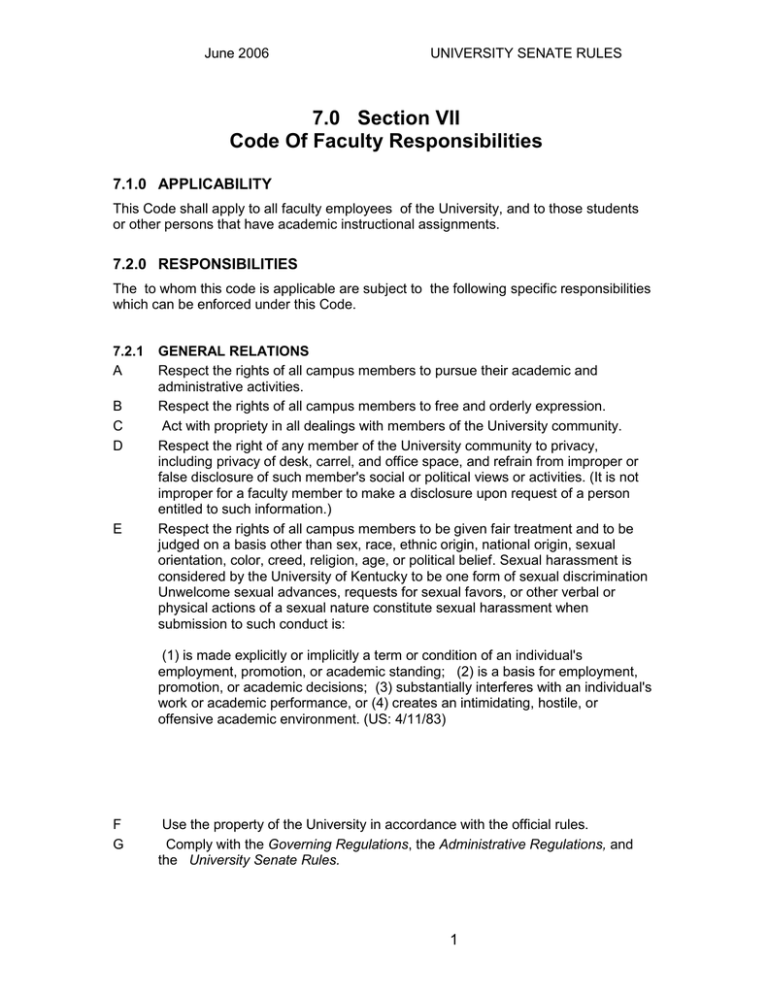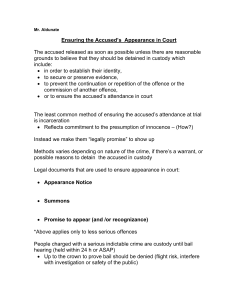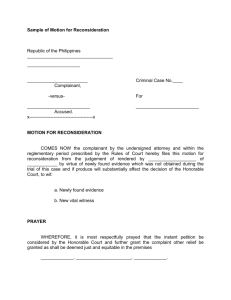7.0 Section VII Code Of Faculty Responsibilities 7.1.0 APPLICABILITY
advertisement

June 2006 UNIVERSITY SENATE RULES 7.0 Section VII Code Of Faculty Responsibilities 7.1.0 APPLICABILITY This Code shall apply to all faculty employees of the University, and to those students or other persons that have academic instructional assignments. 7.2.0 RESPONSIBILITIES The to whom this code is applicable are subject to the following specific responsibilities which can be enforced under this Code. 7.2.1 A B C D E GENERAL RELATIONS Respect the rights of all campus members to pursue their academic and administrative activities. Respect the rights of all campus members to free and orderly expression. Act with propriety in all dealings with members of the University community. Respect the right of any member of the University community to privacy, including privacy of desk, carrel, and office space, and refrain from improper or false disclosure of such member's social or political views or activities. (It is not improper for a faculty member to make a disclosure upon request of a person entitled to such information.) Respect the rights of all campus members to be given fair treatment and to be judged on a basis other than sex, race, ethnic origin, national origin, sexual orientation, color, creed, religion, age, or political belief. Sexual harassment is considered by the University of Kentucky to be one form of sexual discrimination Unwelcome sexual advances, requests for sexual favors, or other verbal or physical actions of a sexual nature constitute sexual harassment when submission to such conduct is: (1) is made explicitly or implicitly a term or condition of an individual's employment, promotion, or academic standing; (2) is a basis for employment, promotion, or academic decisions; (3) substantially interferes with an individual's work or academic performance, or (4) creates an intimidating, hostile, or offensive academic environment. (US: 4/11/83) F G Use the property of the University in accordance with the official rules. Comply with the Governing Regulations, the Administrative Regulations, and the University Senate Rules. 1 June 2006 H I 7.2.2 A B C D E F G H I UNIVERSITY SENATE RULES Engage in consulting outside the University assignment only in accordance with the established provisions. State, when speaking as a private person and the institutional affiliation is mentioned, that he or she does not speak for the University of Kentucky. STUDENT RELATIONS Uphold the student academic rights as set forth in the University Senate Rules (see Section VI). Present the subject matter of a course as announced and approved by the faculty in accordance with the procedures set forth by the University Senate, and to avoid the persistent intrusion of material which has no relation to the subject. Meet classes as scheduled in accordance with University regulations. (Absences caused by illness or emergencies are clearly excusable; absence owing to attendance at scholarly meetings, occasional professional service, pedagogical experimentation, and the like, are exceptions which should be approved by the department chair and, where appropriate, substitution or reschedulings should be arranged.) Be available to students for advising and other conferences, preferably by posting office hours and/or by allowing students to arrange for appointments at other mutually convenient times. Arrange for appropriate interaction and communication with graduate students in the direction of their theses. Return to, discuss with, or make available to students all papers, quizzes and examinations within a reasonable period of time . If any of the records mentioned above are not returned to the students, they shall be retained by the instructor until 365 days subsequent to the conclusion of the academic. In addition, student records and grading policy procedures including roll books, syllabi and attendance records (if applicable)--or copies of this information--shall be kept on file with the instructor or the department office whenever the instructor will no longer be available.(US: 10/16/89) Give final examinations in accordance with procedures approved in Section V., 5.2.4.6. Inform students when their individual or collective efforts are to be used for professional or personal advancement of a faculty member, or when the student(s) is (are) to be used as research subject(s), and in either case, to ensure that the student may elect not to participate without prejudice to his or her academic standing; and to recognize appropriately any significant contribution by the student(s). Know the academic requirements and the various degree programs of the University affecting students whom they advise. 7.3.0 ENFORCEMENT Any member of the University community (faculty, staff member, or student) with a complaint about an alleged violation of these responsibilities shall process it through the following prescribed channels. The process should begin with discussion with the person accused of the violation, although a student is not required to discuss his/her 2 June 2006 UNIVERSITY SENATE RULES complaint with the faculty member before seeking mediation by the Ombud. If a satisfactory solution between the parties cannot be accomplished, then the accused's immediate supervisor or, if the complainant is a student, the Academic Ombud shall be asked to mediate. If such mediation proves unsuccessful then the matter shall be forwarded to the accused’s next administrative supervisory level with a written report concerning the matter with copies of the report to the parties involved. This process of mediation and report shall follow normal supervisory reporting channels up to and including the dean of the college to which the person accused of a violation is assigned. If the academic offense involves research and/or extramural funding the administrative rule for handling the offense is outlined in Administrative Regulation II - 4.0.2. [US: 2/10/97] In the event that after the appropriate processing through these channels the dean is unable to mediate satisfactorily between the parties, or in the event that the dean is the complaining party and is unable to accomplish a satisfactory solution with the accused, he/she shall make a written report containing his/her recommendations and findings and forward it to the Provost through the University Senate Advisory Committee on Faculty Code (SACFC) with copies to the accused and the complainant. Upon receipt of the report from the dean, the SACFC shall set a date for a hearing which must be within thirty (30) days of receipt of the dean's report. The SACFC shall then determine whether to hold closed or open hearing(s) after consultation with the parties in dispute. After the completion of the hearing(s), the SACFC shall forward its recommendations to the Provost with respect to (1) whether or not the accused has violated the Code, and, if so, (2) the type of sanction, if any, which should be imposed. The Provost shall make a final decision after review of the report of the SACFC. In any event, however, the accused shall have the normal right of appeal to the President and the Board of Trustees in accordance with established procedures. 7.4.0 SANCTIONS Sanctions which may be recommended by the SACFC include: A B C D A warning that conduct violates the Code as interpreted. A reprimand: 1. Informal (to accused only); 2. Formal (to accused with notice to his/her administrative superior). Forfeiture of pay from present salary for actual monetary damage suffered by the University through unauthorized use of University property. Recommendation for proceeding under KRS 164230, dismissal for reasons of "incompetency, neglect of or a refusal to perform his/her duty, or of immoral conduct" Note: Nothing in this document is intended to inhibit in any way the right of the Provost to initiate charges against a faculty member under KRS 164.230 in accordance with the procedures established by the Governing Regulations so long as no written report has yet been received by the SACFC from the dean. 3 June 2006 UNIVERSITY SENATE RULES 7.5.0 RIGHTS OF THE ACCUSED A In all proceedings under this Code the accused individual has the right: 1. to be heard in his or her own defense; 2. to be informed in writing of the complaint with full particulars and to be given at least 20 days before any action is taken to answer the complaint. The requirement that the accused individual be informed in writing of the complaint at least 20 days before any action is taken refers to a hearing before the SACFC, not to any step in the mediation process; the SACFC has the responsibility for providing this information to the accused individual. 3. B 7.6.0 to enjoy professional privileges while appealing or undergoing a hearing process. (This does not mean that a change of assignment cannot be made in accordance with the Governing Regulations.) With regard to all proceedings of the SACFC, the accused individual has the right: 1. to receive a copy of all rules and procedures governing the actions of the SACFC in sufficient time to familiarize himself or herself with them; 2. to have counsel, and to question the witness(es) against the accused, to present evidence and/or witness(es) in his or her own behalf in all SACFC processes; 3. to challenge the impartiality of anyone sitting on the SACFC and to have up to two of the members of the SACFC replaced; 4. to remain silent when testimony might tend to be detrimental to himself/herself, such refusal not to be used by the SACFC in making its decision. RIGHTS OF THE COMPLAINANT(US: 2/9/87) No member of the University or community shall be penalized academically or professionally for filing or processing a complaint in good faith under this Code. A In all proceedings under this Code, a complainant has the right: 1. to be heard as to her or his complaint; 2. to receive a copy of any responses from the accused to the complainant's charges; B With regard to all proceedings of the SACFC, the complainant has the right: 1. to receive a copy of all rules and procedures (SR 7.3.0) governing the actions of the Committee in sufficient time to familiarize herself or himself with them; 2. to have counsel or other advisor present, to question the witness(es) of the accused, and to present evidence and/or witness(es) in her or his own behalf in all SACFC processes; 4 June 2006 3. UNIVERSITY SENATE RULES to challenge the impartiality of anyone sitting on the SACFC and to have up to two of the members of the SACFC replaced. 7.7.0 LIMITATIONS Any complaint processed under these procedures must be initiated within sixty (60) days of knowledge of the alleged violation of any of the listed responsibilities as stated herein, but in no event later than one year after the actual commission of the alleged offense. With respect to students, this requirement is met if the student has communicated the complaint to the Academic Ombud within the sixty (60) day time prescribed in these Rules. 7.8.0 COMPOSITION OF COMMITTEE A BASIC AND SPECIAL PANELS The SACFC shall consist of: 1 2 A basic panel consisting of six (6) regular and three (3) alternate members together with a chair (who shall be non-voting except in the case of a tie vote), all of whom shall be tenured members of the University faculty of at least the rank of Associate Professor, and, Two separate panels, one of six (6) undergraduate students who shall have at least junior status and one of six (6) graduate and/or professional students including at least three (3) with teaching or research responsibilities. B USE OF PANELS When neither the complainant nor the accused is a student, the SACFC shall operate solely with the basic panel. If, however, the complainant or the accused is a student, he or she shall have the right to have two members of the panel of the student's own status (graduate, professional or undergraduate, as available) added to the basic panel. The two student members shall be chosen at random by the chair of the SACFC. In the event that the accused and complainant are both graduate students, only two students from the graduate panel will be selected. C SELECTION OF PANEL MEMBERS The chair, six regular basic panel members and the three (3) alternates shall be selected by the President of the University from a list recommended by the University Senate Council in accordance with established procedure (GR IV.B). The SACFC members and alternates shall serve three year terms on a staggered basis. The student panel members shall be selected by the President of the University from lists submitted by the Student Government Association in accordance with its established procedures. In the case of the graduate students, the Student Government Association is directed to consult with the Graduate Student Congress or appropriate professional student organization, in making its recommendations. The term of office for each student member shall be one (11) year and the individual member may be reappointed once. 5 June 2006 UNIVERSITY SENATE RULES 7.8.1 RECOMMENDATIONS OF THE SACFC The recommendation of the SACFC shall be determined by majority vote. In the event of a tie vote, the tie shall be broken by the decision of the chair. The findings and recommendations of the SACFCe shall be transmitted to the complainant and the accused as well as to the Provost. The Provost shall thereupon make his/her decision and report it to the accused, the complainant, and the forwarding administrator, with copies to the chair of the SACFC. 6





